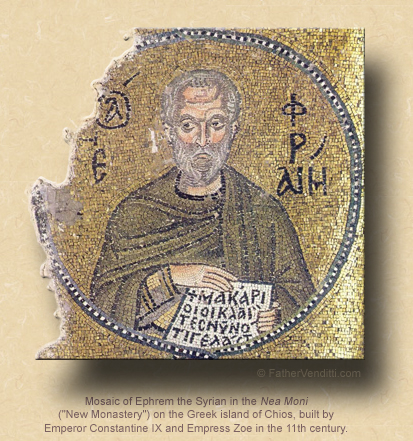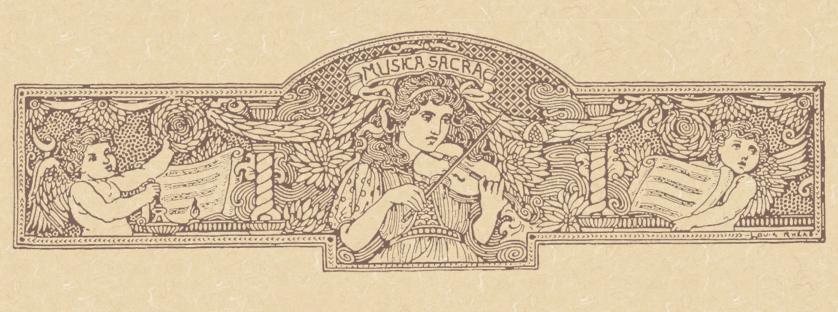The Best Priests Are the Ones Who Never Wanted to Be.
The Tenth Thursday of Ordinary Time; or, the Memorial of Saint Ephrem, Deacon & Doctor of the Church.
Lessons from the secondary feria, according to the ordinary form of the Roman Rite:
• I Kings 18: 41-46.
• Psalm 65: 10-13.
• Matthew 5: 20-26.
The Third Thursday after Pentecost; and, the Commemoration of Saints Primus & Felician, Martyrs.*
Lessons from the dominica,** according to the extraordinary form of the Roman Rite:
• I Peter 5: 6-11.
• Psalm 54: 23, 17, 19.
• Luke 15: 1-10.
|
If a Mass for the commemoration is taken, first lesson from the common, Gradual & third lesson from the proper:
• Wisdom 5: 16-20.
• Psalm 88: 6, 2.
• Matthew 11: 25-30.
|
The Third Thursday of the Apostles Fast; and, the Feast of Our Holy Father Cyril, Bishop of Alexandria.
First & third lessons from the pentecostarion, second & fourth from the menaion, according to the Ruthenian recension of the Byzantine Rite:
• Romans 11: 13-24.
• Hebrews 13: 7-16.
• Matthew 11: 27-30.
• Matthew 4: 14-19.
FatherVenditti.com
|
 8:21 AM 6/9/2016 — Last Friday, on the Solemnity of the Sacred Heart, I spoke to you about Saint Margaret Mary, to whom is credited the establishment of that feast, and the connection I had with her and the Visitation Sisters early in my life that contributed to my vocation to the Holy Priesthood. 8:21 AM 6/9/2016 — Last Friday, on the Solemnity of the Sacred Heart, I spoke to you about Saint Margaret Mary, to whom is credited the establishment of that feast, and the connection I had with her and the Visitation Sisters early in my life that contributed to my vocation to the Holy Priesthood.
Today we celebrate the memorial of a saint that you've probably never thought about: Saint Ephrem the Syrian. He was not a priest, but it's precisely because he was not a priest that his life causes us to think of the priesthood.
He was a full-blooded Syrian who grew up in Mesopotamia in the Fourth Century. As a young man he was a gifted student, and became so respected for both his learning and his holiness that he was made Master of the school in the city of Nisibis. It was during this time that the Church fell prey to many vociferous heresies regarding the nature of Christ and, particularly, the Virgin Mother of God. He became so skillful at combating and arguing against these heresies that the bishop of Edessa, a city in what is now Turkey, made him a deacon with authority to preach. He was also a gifted musician and wrote many beautiful hymns, his most famous ones being about the Blessed Virgin Mary. In fact, some historians claim that it was Saint Ephrem who actually introduced the custom of singing hymns in church and, in the Byzantine Tradition in which I used to serve, many of his hymns are still sung. His teachings were considered so important to the survival of the Church that Pope Benedict the XV, the pope after whom our Pope Emeritus took his name, declared him a Doctor of the Church, a title reserved only for those few saints whose teachings are considered so important that the Church would not have been the same without them.
Saint Ephrem causes us to think of the Holy Priesthood because, when the Bishop of Edessa made him a deacon, he tried to make him a priest as well, but Ephrem refused. In his humility, he could not conceive of himself ever being worthy enough to receive such a great grace.
Which means that he probably would have made an excellent priest. And if your experience is at all like mine, you've known a few priests whom you wish had had that kind of humility. I'm sure some of my former parishioners have thought that about me from time to time.
As we celebrate his memorial today, I ask you again, as I did last Friday, to beg our Blessed Mother to watch over her Son's priests, keep them faithful, support them in their sufferings, and keep them ever faithful to their calling with the kind of humility that Saint Ephrem so perfectly displayed.

* Primus and Felician were brothers. After suffering the most cruel torments for the Faith, they were beheaded at Rome in AD 286.
** In the extraordinary form, on the ferial days outside of privileged seasons, the lessons are repeated from the previous Sunday.
|

